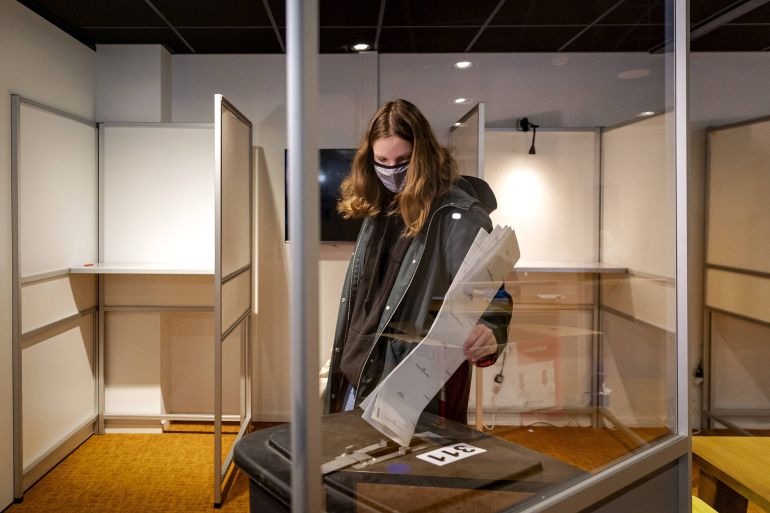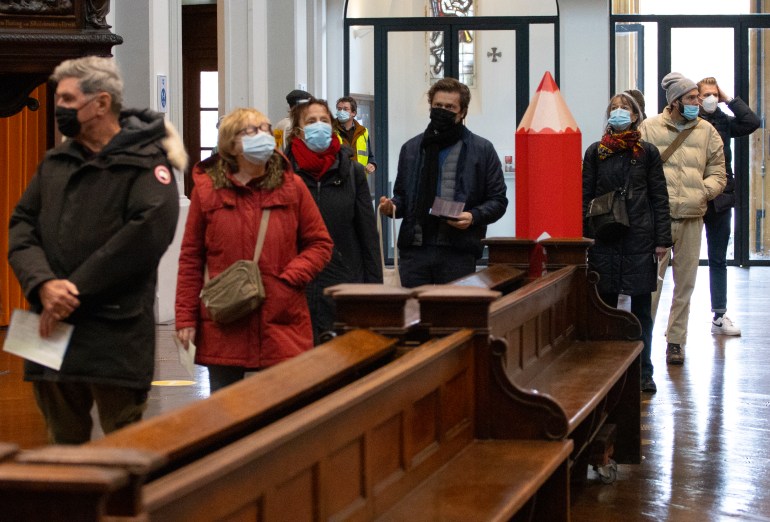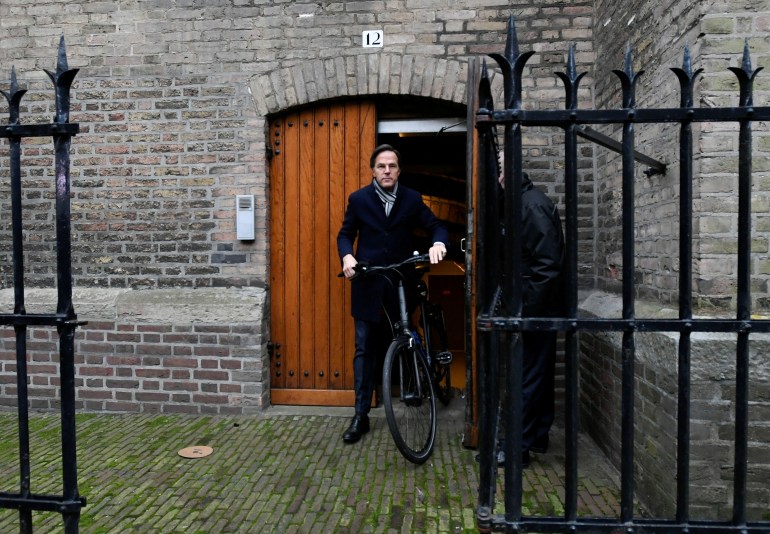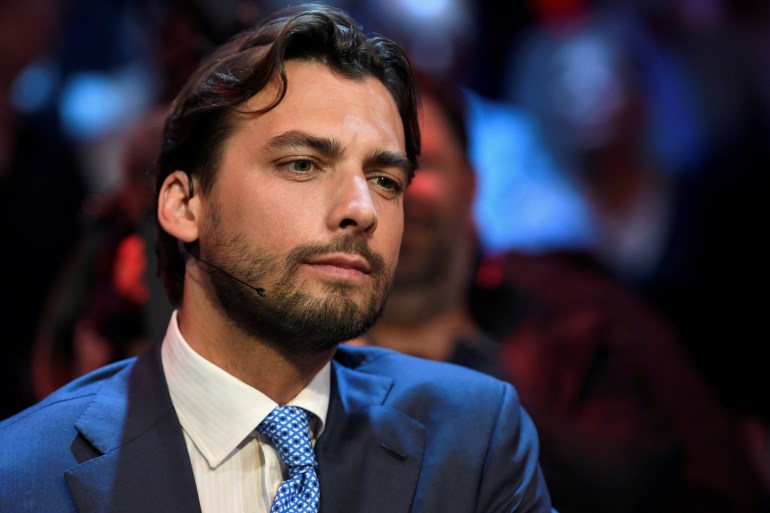Netherlands: Historic vote in the shadow of anti-lockdown riots
The vote is viewed by some as a referendum on the government’s management of the coronavirus crisis.

The Hague, Netherlands – For the first time since a controversial curfew was implemented in the Netherlands on January 23, the much-discussed lockdown measure is being partially suspended to allow people to vote in general elections this week.
These are the first parliamentary elections in Western Europe since the start of the COVID-19 pandemic, and the health crisis has dominated the campaign.
Keep reading
list of 4 itemsBlast at Dutch COVID test centre appears intentional, police say
Police break up anti-lockdown protest ahead of Dutch elections
Voting starts in three-day Dutch election dominated by COVID-19
There are also other firsts, given the nature of the pandemic.
For the first time since 1894, the elections are spread across three days to allow risk groups to vote before the main election date, March 17 – this Wednesday.
Never before were voters aged 70 and older allowed to cast their vote by post. Additionally, voters can cast three proxy votes instead of two.
The conservative-liberal party of Prime Minister Mark Rutte, the People’s Party for Freedom and Democracy, or VVD, has a substantial lead in the polls.
If the VVD wins, it is likely that Rutte will serve a fourth term, making him one of the longest-running premiers in Dutch history.
“The appreciation for Rutte has increased enormously during this pandemic,” Sjoerd van Heck, pollster at Ipsos, told Al Jazeera. “We saw a big shift of electoral seats towards the VVD. Voters believed he was steering the country through this crisis well.”

But pressure on the government has increased over the last couple of months due to continuing tensions around coronavirus measures and a vaccination programme that took longer than most European countries to take off.
On January 15, the government collapsed over a child benefits scandal during which thousands of parents – among them many ethnic minorities – were falsely accused of fraud by the tax authorities.
The week after the cabinet resigned, the caretaker government voted in favour of the now-infamous curfew which came into action on January 23. The nights that followed were filled with riots and protests. Shops were looted, police were attacked and a coronavirus test centre was set on fire.
Yet Rutte’s popularity was still high.
“Strangely enough the child benefits scandal and riots didn’t show a significant effect on the polls,” Van Heck said. “People are more worried about how to get through this crisis. Other topics have been put on the back burner.”

The Dutch political landscape is fragmented. A post-war record of 37 parties are participating in these elections. In 2017, there were 28 parties on the ballot.
The VVD currently has 32 seats; polls estimate outcomes of just below 40 seats. But the party is still far from the required 76 seats for a majority in the House of Representatives.
Currently in second place is the far-right Party for Freedom (PVV), led by Geert Wilders, closely followed by no less than five other political parties.
The right-wing populist party Forum voor Democratie (FvD), led by Thierry Baudet, is a fairly new player in the political game. The party first participated in the 2017 election and won two seats – a number expected to double.
FvD is known for opposing all of the government’s COVID-19 measures.
“Baudet has made explicitly racist, homophobic, anti-Semitic claims,” said Léonie de Jonge, assistant professor in European Politics and Society at the University of Groningen. “He’s copying a Trump playbook during his campaign, already saying we should be vigilant of fraudulent mail ballots. He is a new far-right challenger for Geert Wilders.”
The Dutch political system is one of equal representation. The Netherlands has no official electoral threshold, meaning any party that manages to obtain 0.67 percent could get a seat in the House of Representatives.
“That helps explain why the political landscape is so splintered,” said De Jonge.
“There are no big parties any more, only medium and small-sized parties. They all cater to slightly different electorates. That’s what makes it difficult for them to form a block against Rutte.”
The similarities between these parties make it hard for the 13.1 million potential voters to make a decision. With almost all attention is focussed on the pandemic, some have found it challenging to understand what a party stands for.
Online electoral guides are widely used in the Netherlands and have become even more popular during these elections. The Stemwijzer website is the most well-known.
“We can see that the Stemwijzer has been used 6.2 million times,” said Anita de Jong, acting deputy director of ProDemos, the organisation behind the electoral guide. “And we know that in the days prior to the election, this number goes up by about a million per day.”

Because of the pandemic, most parties avoided traditional campaigning methods.
“Parties are looking for alternative ways to reach citizens and try to be active on as many social media platforms as possible,” Sanne Kruikemeier, associate professor of Political Communication and Journalism at the University of Amsterdam, told Al Jazeera. “This is an election that is mainly played out through the media.”
But despite the lockdown, FvD decided to actively campaign in person.
“The election cannot come soon enough for Rutte,” said De Jonge, at the University of Groningen. “Every day longer means extra votes for Baudet. He might persuade people to vote for him not because of ideological reasons, but because people are fed up with the coronavirus measures.’
Rutte has already indicated that he would rule out a coalition with Wilders’s PVV and Baudet’s FvD – meaning smaller parties may join the governing coalition.
“It seems like parties have accepted that Rutte will win this election and are afraid to attack him,” said De Jonge. “They are positioning themselves for coalition talks. Everyone is hoping that they might make their way in.”
The turnout will decide the final outcome. But that too may be different compared with other elections due to coronavirus fears.
“The elderly are a little more loyal when it comes to voting, but perhaps their turnout will be lower this year,” said pollster Van Heck. “That would mean that the votes of younger people count stronger this year.”
Polls will close at 9pm local time on Wednesday. A first exit poll will be available right afterwards.